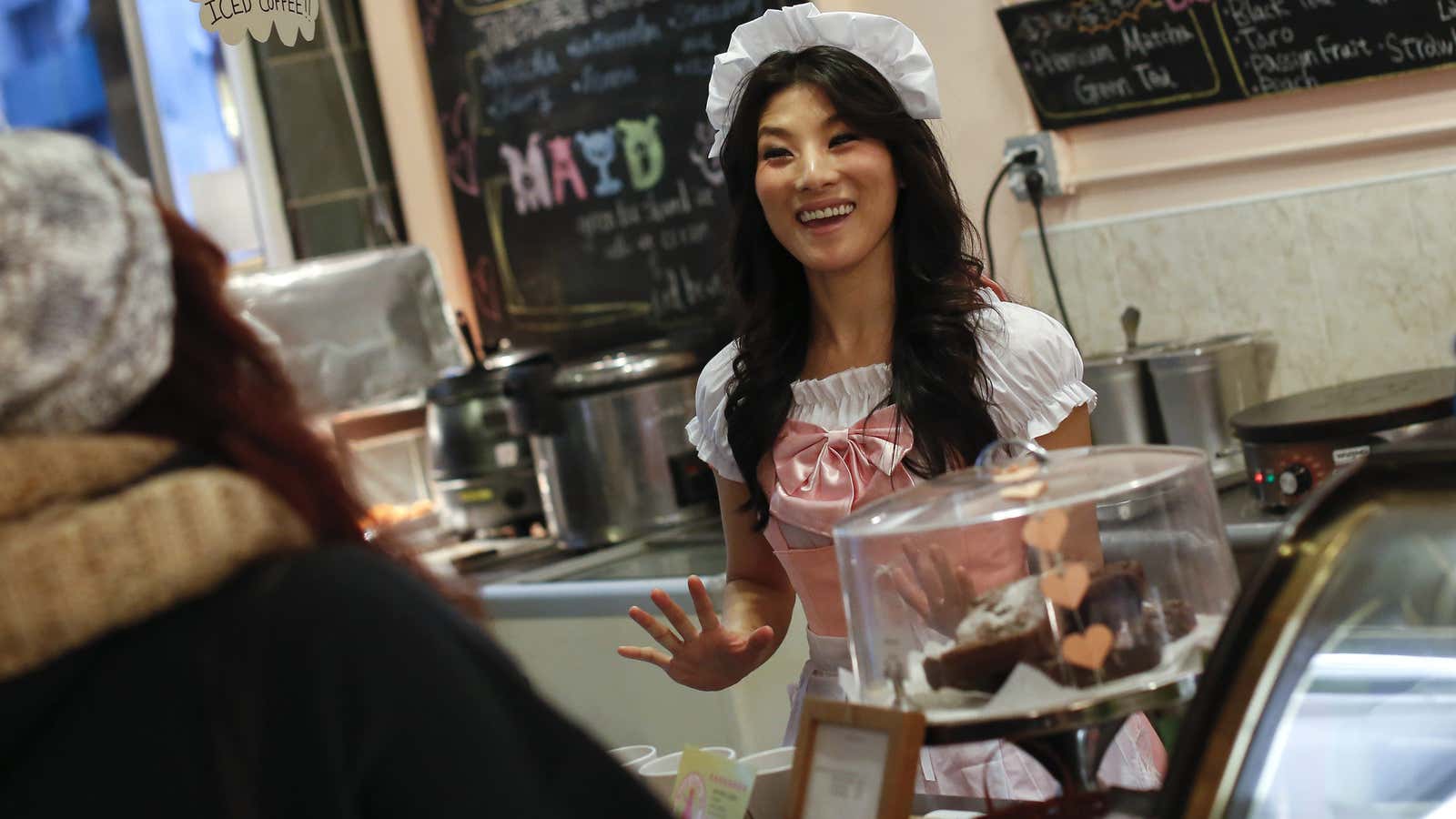“How’s your day going?” can be a truly personal question. It’s banal chitchat if all is well, but if you’re going through immense trauma or crisis, it can feel invasive. Once, it might have been possible to brush off the question with a polite “fine” but we live in a world that no longer settles for polite. Instead, we’re expected to be cheery and positive, regardless of what we’re feeling inside.
“Emotional labor,” namely manipulating your own emotions to meet others’ expectations, is most obvious and well-studied in the workplace. As factory line jobs that involve manual work have become less common over the centuries, more and more people are employed in service work, where manner and demeanor are part of the job description. Waiters, shop assistants, baristas, and housekeepers are expected to carry out their job with a smile, masking their feelings to appear gregarious and charming to all customers.
“The constant management of emotion can lead to emotional exhaustion and worker burnout,” says Melissa Sloan, a sociology professor at University of South Florida who has studied the effects of emotional labor. “When you’re constantly changing the expression you give off to others, it can interfere with the signal function your emotion serves. It can be consequential to the self because workers are displaying a person to others that’s not necessarily congruent with who they think they are.”
Even customers who don’t know the term “emotional labor” recognize that service employees are often paid to be friendly—and employees in low-paying jobs are most likely to be told to mask their feelings—and so make an effort to respond with a similarly wide smile. After all, no one (hopefully) wants to be a jerk and it can feel rude not to meet a cheery greeting with an equally positive response.
But this, of course, does nothing to alleviate the burden of being paid to be happy, and instead means that emotional labor is spreading. Those in service jobs have to be happy, so do customers, and every public interaction is crammed with false optimism and forced smiles and cries of “awesome!”
Sociologists recognize that different cultures have varying degrees of managing emotions, explains Sloan. Some have an institutional approach, and dictate what feelings and emotional expressions are appropriate. Others are more impulsive, and believe people should express whatever emotion they feel freely. “In the US, the culture is more and more characterized by these institutional norms of emotional expression,” says Sloan. “There’s a big difference between being polite and being forced to be friendly.”
It can sound miserly to complain about being friendly, but the implications can be quite harmful—especially for those who are experiencing strong negative emotions. Recently, when I had a major physical trauma and significant psychological fallout, I became increasingly aware of and distressed by the insistence on happiness. It felt profoundly wrong to buy food in between hospital visits, say, and be told to have a great day. Other demands for gregariousness were more relenting. In an Uber from my therapy session, for example, the driver repeatedly tried to make pleasant conversation. This was a time when I could barely talk to my closest family, and I was simply incapable of making chitchat with a stranger.
I’m sure he marked down my Uber rating. And, while that’s hardly important on a small scale, the idea of constantly being rated for friendliness is only increasing the pressure to mask our emotions. Aziz Ansari’s recent SNL sketch on ratings pressure is funny precisely because it’s so relatable.
But from another perspective, the constant need to put on a good face and charm others can look dystopian. The first episode of Black Mirror’s latest season, “Nosedive,” shows a not-too-distant future where every person has an individual score, made up of ratings given by every person they encounter throughout the day. This rating doesn’t just affect their ability to get a cab ride, but what property they can rent or jobs they can have. It’s a world of constant, forced optimism and no genuine emotions.
As with all social demands, the effects vary according to gender and ethnicity. Sloan’s study on the subject shows that African American workers in the US have to put a lot more effort into suppressing emotions than their white colleagues, and that this was directly linked with greater job dissatisfaction. Further research shows that women are far less likely than men to show anger in the workplace, and far more likely to express happiness—and not because they feel happier than men, but due to pressures to appear cheerful. Whereas men are allowed to be brusque or firm, women are under greater expectation to minimize their emotions and appear amiable at all times.
Changing cultural expectations is hardly easy, but Sloan suggests starting where emotional labor begins: the workplace. “There have been calls for workplaces to do away with expectations of emotional labor and give workers more autonomy in their expressions,” she says. Instead of being incessantly friendly back to those in service industries, it’s far healthier to demand that everyone should all be allowed to be sad or simply neutral, regardless of profession.
After all, reality dictates that we will all, at some point, experience a profoundly difficult time. But western culture increasingly leaves little personal space for those who’ve just suffered a major loss or tragedy and want to move through the world without being told to smile. Sometimes you just don’t want to tell a stranger how your day’s going.
